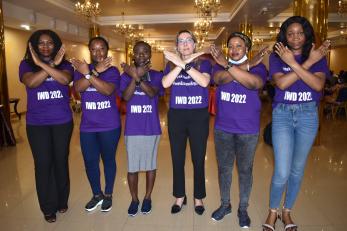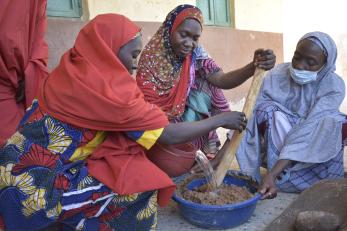Engendered business cases for Women Economic Empowerment in Northeast Nigeria

Everywhere, every day, women are overlooked and undervalued, yet they play vital roles across agricultural value chains and in marketplaces. These are the barriers that not only harm women and their families but also their businesses, sectors, markets, and industries that would benefit from their enhanced participation. Notwithstanding, women own large companies, and lead corporations, cooperatives, and organizations. They work as reliable employees and contribute countless hours of unpaid labor attending to family, and on and off-farm operations.
In Africa, studies show that across several countries, women are far more entrepreneurial than men compared to other parts of the globe—more women (26% of adults) than men choose to become entrepreneurs, and 50% of businesses are women-led. The downside is that women-led businesses are often small and in low-value-added sectors: a) women-led businesses have fewer employees, lower revenues and profits; b) they make up almost 70% of all micro-and small-sized businesses. An additional pain point is that there is inadequate female representation in formal businesses: i) only one-third of formal businesses have at least one female owner; 17% have 50/50 female/male ownership and ii) women-led businesses are skewed towards service industries such as retail and other informal sectors.
The USAID funded Feed the Future Nigeria Rural Resilience Activity approaches women’s economic empowerment from three interrelated dimensions—access, control, and agency. With access to income and assets, where women have a source of income, they are on the path to becoming empowered economic actors. Control of and benefit from economic gains - when women are able to decide where, when, and how to spend their income, and see improvements in their social and economic status. Agency to make decisions, as decision-making is a core expression of agency and refers to the capacity of women to take purposeful action and pursue goals free from the threat of violence.
Our approach pushes for women to participate equally in existing marketplace opportunities: their access to and control over productive resources; access to decent work and income; control over their own time and income; and increased voice, agency, and meaningful participation in economic decision-making at all levels from the household to institutions.
We believe that investing in women’s economic empowerment sets a direct path toward gender equality, poverty eradication, and inclusive economic growth. As a project, we have set up a special purpose vehicle intervention to pilot and scale viable models alongside viewing all the other interventions through the lens of the three pillars of women's economic empowerment.

At the heart of our approach is identifying and/or discovering business cases. A business case typically presents the rationale for pursuing a different practice, service, or product. The Rural Resilience Activity has developed an engendered business case to explore business models that engage women as consumers, entrepreneurs, suppliers, distributors, etc.
Our business cases place women at the center of new marketplace opportunities, what options could potentially be explored by engaging women on either side of demand and supply, the value proposition for women, the timeline, potential social and economic return on investments, recommendations considering contexts and constraints, and risks for engaging women in Northeast Nigeria. Our business cases offer tangible proof that enterprises can profit from investing in addressing challenges experienced by women-facing business models.
As the overarching intent of these business cases, we try to capture and communicate the social and business outcomes of inclusive business models for replication and adaptation within the private sector. At all times, we try to capture data intentionally and present and package it in a way that “speaks” to the business community using commercial language and data that resonates with enterprises’ interests and incentives.
By showcasing new ways of thinking and operating, the Rural Resilience Activity aims to encourage companies in the private sector, as well as the government and development community, to examine and implement inclusive and innovative ways of doing business.
One tangible example is where we partnered with Solar Sisters, a social enterprise that creates a deliberately woman-centered network of entrepreneurs. Solar Sisters brings the breakthrough potential of clean energy technology to the most remote communities in rural Africa. Solar Sisters’ business model involves training a direct sales agent (DSA) known as a Solar Sister Entrepreneur, who buys lights and cookstoves from Solar Sisters, then sells and delivers them to her family, friends, and neighbors. Solar Sisters’ service pack includes the provision of essential services and training that enables women entrepreneurs to build sustainable businesses in their own communities.
Direct Sales Agents (DSA) create customer awareness of companies' products and services. They are responsible for presenting companies' products and services to potential customers and closing sales.
From our analysis, DSA is a proven and successful model that works very well in a context like Northeast Nigeria. In this region, women face additional challenges than men in order to engage in business, the Rural Resilience Activity applies a combination of push and pull strategies to facilitate women’s role as DSAs. This includes:
- defining the DSA model’s expected Women’s Economic Empowerment (WEE) outcomes (e.g. improved incomes, increased agency, gender work balance, etc.) and interventions to achieve these outcomes.
- encouraging more women to join businesses as DSAs by creating awareness about the business opportunity – especially among women farmers and market traders.
- building the capacity of market actors to engage more DSAs. This could be through promoting awareness of the business case for engaging DSAs, working with them to build incentives for women’s participation, promoting savings and access to credit by DSAs, etc; and
- systematically monitoring and evaluating women’s empowerment through the DSA model, by adapting tools such as the Women’s Empowerment Index.
A woman is economically empowered when she has both the ability to succeed and advance economically and the power to make and act on economic decisions. We believe that for women in rural Northeast Nigeria to succeed and advance economically, women need the skills and resources to compete in markets, as well as fair and equal access to economic institutions. Secondly, to have the power and agency to benefit from economic activities, women need to have the ability to make and act on decisions and control resources and profits.
Going forward, the Activity will monitor, learn, adjust and refine the DSA model by monitoring women's participation in activities, if there are increased self-efficacy, ability to make decisions, whether women are adopting new skills, changes in business practice, increased bargaining power, access to new markets, increasing profit, increased financial independence, and improved livelihood. The DSA model will also be scaled to other interventions such as access to financial services, sales of insurance products, agricultural inputs, and grain trade.
Written by: Dooshima Tarkehe Anita, Anuoluwapo Fashola, and John Rachkara